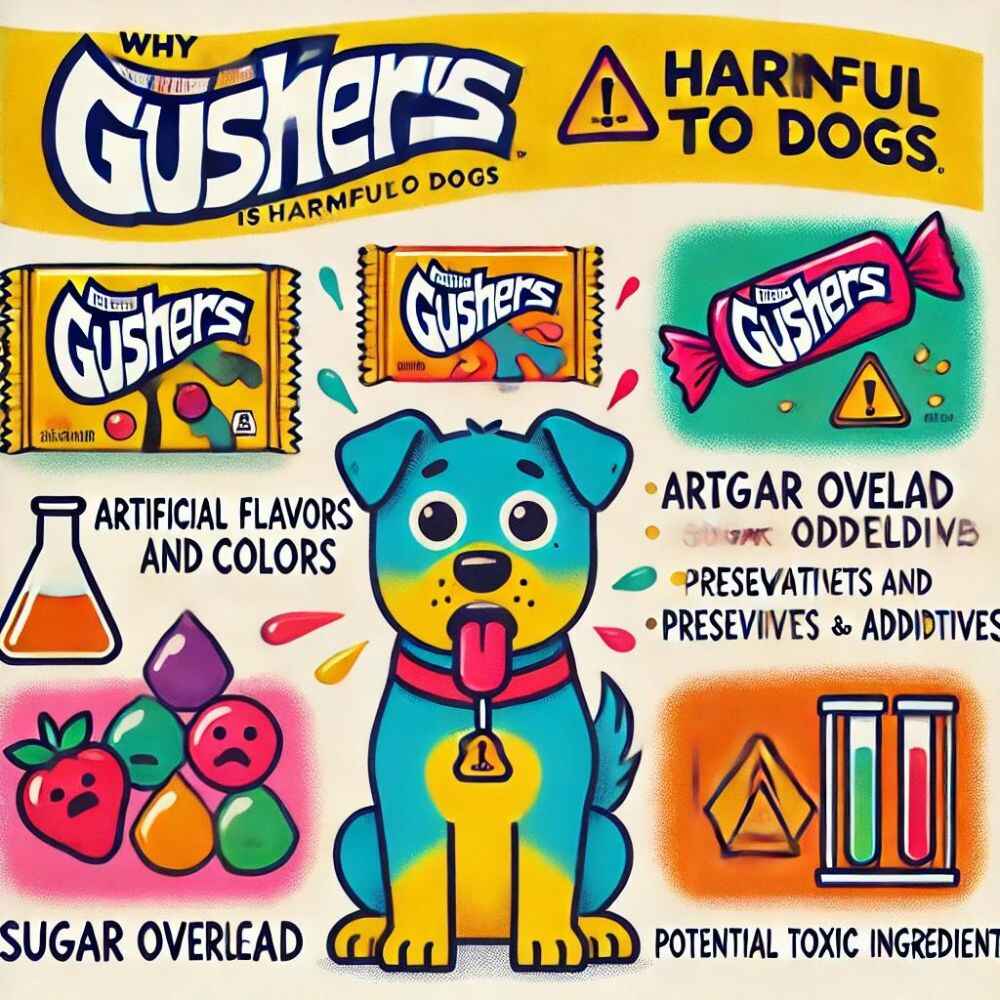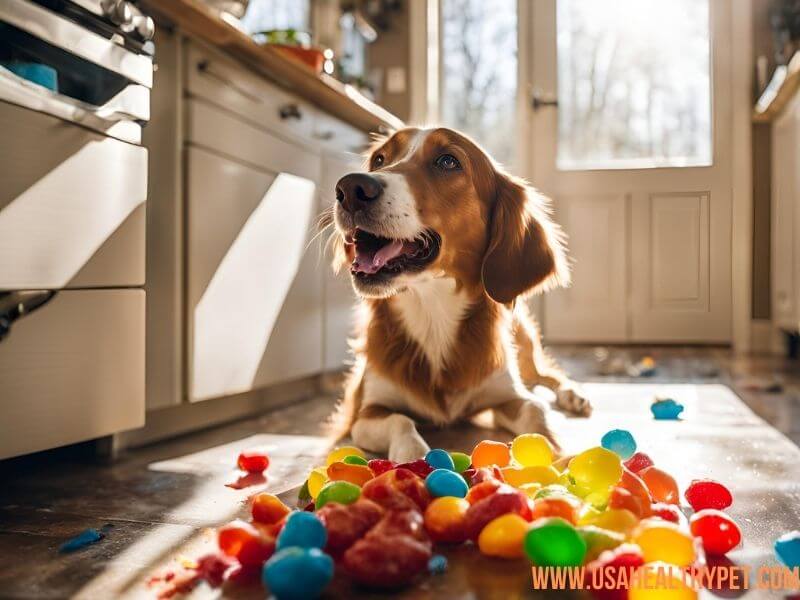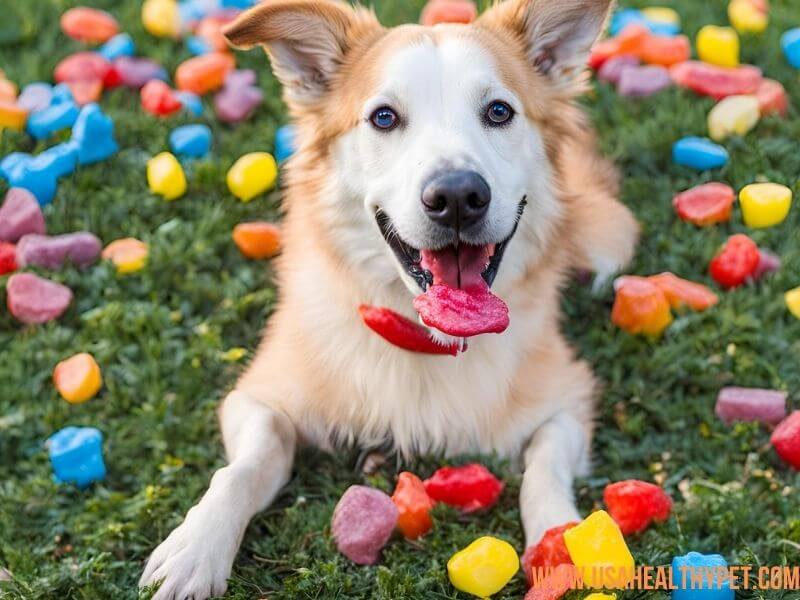For us humans, Gushers are a fun, sugary treat that takes us back to childhood. But if you’re a dog owner, you may have wondered, Can I share Gushers with my dog? After all, it’s tempting to give your furry friend a little piece of whatever you’re enjoying, right?
Let’s break this down and see whether Gushers are a good choice for your dog—or if it’s best to keep them to yourself.
Are Gushers Safe for Dogs?
No, dogs should not have Gushers. While they might beg for a bite, these colorful snacks are far from healthy for dogs. Gushers are packed with sugar, artificial ingredients, and preservatives—things that don’t sit well with a dog’s digestive system.
Unlike humans, dogs have different dietary needs and their bodies aren’t designed to process sugary, processed snacks.
But why exactly are Gushers bad for dogs? Let’s dive deeper.
Why Are Gushers Bad for Dogs?
The reason Gushers are unsafe for dogs is because of their ingredients.
Sure, a tiny piece probably won’t cause an immediate health issue, but feeding Gushers to your dog—whether regularly or as a one-time snack—can lead to some serious health issues.

Harmful Ingredients in Gushers
Here’s a closer look at why the ingredients in Gushers are harmful to your dog’s health:
1. Artificial Flavors and Colors
Dogs don’t need bright colors or exciting flavors to enjoy their food. In fact, artificial colors and flavors are unnecessary and can be harmful.
These chemicals are added purely for human enjoyment, not for any nutritional benefit. For dogs, they can irritate their stomachs or even trigger allergic reactions.
According to Dr. Karen Becker, a veterinarian, artificial ingredients can be harsh on a dog’s system and may cause allergic reactions or digestive discomfort in sensitive dogs.
2. Sugar Overload
Gushers are sugar bombs. Dogs, unlike humans, don’t need sugar in their diet. Feeding them sugary foods can lead to obesity, dental problems, and even diabetes over time.
Even worse, excessive sugar can cause an upset stomach or diarrhea in the short term.
Dr. Jennifer Coates, a veterinarian, explains that consuming too much sugar can also disrupt a dog’s energy levels, causing spikes followed by crashes, similar to what humans experience.
3. Preservatives and Additives
To make Gushers shelf-stable, manufacturers load them with preservatives and other additives that aren’t natural for dogs to digest.
Over time, these ingredients could lead to long-term health complications, including liver and kidney issues.
According to a report from the American Kennel Club (AKC), many processed snacks contain chemicals that are hard for dogs to metabolize, making them a poor choice for a healthy canine diet.
How Gushers Affect a Dog’s Digestive System
When a dog eats something it isn’t supposed to—like Gushers—its digestive system doesn’t quite know how to handle it.
Dogs process food differently from humans, and their stomachs can’t break down artificial ingredients, sugar, or processed snacks easily.

If a dog eats Gushers, it might experience bloating, gas, diarrhea, or even vomiting.
It’s similar to how you might feel after eating way too much junk food—except it’s a lot worse for them because their bodies aren’t used to it.
Can a Small Amount of Gushers Hurt My Dog?
A small amount of Gushers probably won’t lead to a major medical emergency, but it’s still not a good idea. If your dog accidentally sneaks one from the table, keep an eye on them for any signs of distress, like vomiting or excessive thirst.
But be aware, repeated consumption—even in small amounts—can lead to bigger health problems down the line.
What to Do if Your Dog Eats Gushers
If your dog gets into the Gushers bag and eats a few (or a lot), don’t panic. Watch for symptoms like stomach upset, vomiting, diarrhea, or lethargy.
If you notice any of these signs or if your dog seems unwell, it’s best to contact your vet. They may recommend a safe way to ease your dog’s stomach or perform a check-up to ensure everything is okay.
Healthy Snack Alternatives for Dogs
Now that we know Gushers are a no-go, let’s explore some dog-friendly alternatives that will satisfy your pup’s craving for a treat without compromising their health.
1. Fruits
Some fruits make fantastic snacks for dogs. Apples (without seeds), bananas, and blueberries are all safe and healthy choices. They’re natural and loaded with vitamins that are good for your dog’s body.
2. Vegetables
Many dogs enjoy crunchy veggies like carrots, cucumbers, and green beans. These snacks are low-calorie and provide valuable nutrients.
3. Dog-Friendly Treats
If you prefer ready-made options, there are plenty of dog-specific treats available at pet stores. These snacks are formulated to be safe and nutritious for dogs, without the harmful ingredients found in human food.

How to Make Homemade Dog Treats
Feeling creative? You can make your own dog treats at home with just a few simple ingredients. Here’s an easy recipe to try:
Peanut Butter and Oat Dog Biscuits:
- 1 cup of plain, unsweetened peanut butter
- 1 1/2 cups of rolled oats
- 1 mashed banana
Mix the ingredients together, roll into small balls, and bake at 350°F (175°C) for about 15 minutes. Voila! A homemade, dog-friendly snack.
Signs Your Dog Ate Something Harmful
If your dog accidentally eats something they shouldn’t (like Gushers or any other harmful human food), keep an eye out for these warning signs:
- Vomiting
- Diarrhea
- Excessive thirst or urination
- Lethargy or weakness
- Drooling
If you notice any of these, call your vet right away.
The Importance of a Proper Dog Diet
Keeping your dog on a healthy diet is key to a long and happy life. Dogs need a balance of proteins, fats, and carbohydrates from high-quality, dog-specific food.
Their dietary needs are quite different from ours, so it’s important to avoid giving them snacks that are meant for humans.

Can Human Snacks Be Part of a Dog’s Diet?
While it might be tempting to share human snacks with your dog, it’s best to stick to treats designed for them. Some human foods—like fruits and vegetables—are safe, but processed snacks like Gushers should be off-limits.
Understanding Your Dog’s Nutritional Needs
Dogs need a balanced diet that supports their energy levels, fur health, and overall well-being. Always make sure you’re giving them food that meets their specific nutritional needs, which typically include:
- High-quality protein
- Healthy fats
- Essential vitamins and minerals
Tips for Keeping Your Dog Away from Unsafe Foods
It’s easy for dogs to get into things they shouldn’t. Here are a few tips to help keep your dog safe:
- Store human snacks out of reach
- Teach your dog the “leave it” command
- Avoid leaving food unattended
Conclusion: Keep It Safe and Healthy
At the end of the day, we all want the best for our dogs. While sharing everything with our furry friends is tempting, it’s important to be cautious about what we feed them.
Gushers, with their sugar and artificial ingredients, aren’t a safe option for dogs. Instead, stick to healthy, dog-friendly snacks that will keep your pet happy and healthy for years to come.
FAQs
1. Can dogs eat any type of fruit snacks?
It’s best to avoid giving dogs fruit snacks like Gushers, as they contain harmful ingredients. Opt for fresh fruits like apples or blueberries instead.
2. What should I do if my dog eats a Gusher?
Monitor your dog for signs of discomfort and call your vet if they show symptoms like vomiting or diarrhea.
3. Are there safe alternatives to Gushers for dogs?
Yes! Fruits like apples, bananas, and dog-safe treats are great alternatives to sugary human snacks.
4. How much sugar is too much for dogs?
Dogs should avoid sugar entirely, as it can lead to obesity, diabetes, and other health issues over time.
5. Can dogs eat peanut butter?
Yes, as long as it’s unsweetened and doesn’t contain xylitol, a sweetener that is toxic to dogs.
Pingback: Can Dogs Eat Insects? A Complete Guide to Bug-Eating